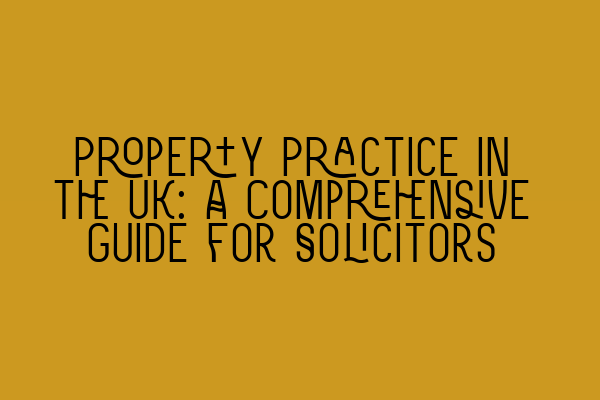Property Practice in the UK: A Comprehensive Guide for Solicitors
Welcome to SQE Property Law & Land Law, your trusted source for all things related to property practice in the UK. As a solicitor, it is crucial to have a solid understanding of property law and the intricacies involved in property transactions. In this comprehensive guide, we will provide you with the necessary knowledge and insights to excel in property practice.
1. Introduction to Property Law
Property law encompasses a wide range of legal issues related to the ownership, transfer, and use of real property. It involves both residential and commercial properties, and solicitors play a vital role in ensuring that property transactions are conducted smoothly and in accordance with the law.
Before diving into the intricacies of property practice, it is essential to have a strong foundation in property law fundamentals. Understanding concepts such as legal estates, equitable interests, and the Land Registration Act 2002 will significantly enhance your ability to navigate property transactions successfully.
Related Article: Interactive SQE Mock Tests for Contract Law: Test Your Knowledge
2. Key Areas of Property Practice
Property practice encompasses various areas, including residential conveyancing, commercial property transactions, landlord and tenant matters, and real estate development. As a solicitor, you may choose to specialize in a particular area or develop expertise in multiple fields.
In residential conveyancing, you will be responsible for overseeing the legal aspects of buying, selling, and remortgaging residential properties. This involves conducting property searches, examining title deeds, and ensuring compliance with regulations.
Commercial property transactions, on the other hand, involve the buying, selling, and leasing of commercial properties such as offices, retail spaces, and industrial premises. Solicitors in this area often deal with complex contracts, negotiation of lease terms, and due diligence procedures.
Related Article: Contract Law Reforms: An Analysis of Recent Changes
3. Landlord and Tenant Matters
Another important aspect of property practice is dealing with landlord and tenant matters. This area of law governs the rights and obligations of both landlords and tenants in the context of a tenancy agreement.
As a solicitor, you may be involved in drafting tenancy agreements, advising clients on their rights and responsibilities, and handling disputes such as eviction proceedings and rent arrears. Having a comprehensive understanding of the Landlord and Tenant Act 1985 and subsequent legislation will be invaluable in this field of practice.
Related Article: Parties in a Contract: Rights and Responsibilities
4. Real Estate Development
Real estate development involves the process of transforming land into a valuable asset through construction, renovation, or redevelopment. Solicitors play a crucial role in this process by advising developers on legal matters and navigating regulatory frameworks.
In this area of practice, you will be involved in various aspects such as land acquisition, planning permission, construction contracts, and financing arrangements. It is essential to stay updated with the Town and Country Planning Act 1990 and other relevant legislation to provide effective advice to your clients.
Related Article: The Importance of Ethics in Contract Law: A Comprehensive Guide
5. Property Disputes and Litigation
Property disputes are inevitable in the field of property practice. As a solicitor, you may find yourself dealing with disputes related to boundaries, rights of way, adverse possession, and restrictive covenants, among others.
Effective dispute resolution and litigation skills are essential in resolving these matters and ensuring the best possible outcome for your clients. Familiarizing yourself with the Civil Procedure Rules and the principles of alternative dispute resolution will give you a competitive edge in this area.
Related Article: Unveiling Duress and Undue Influence in Contracts
Conclusion
Property practice in the UK is a dynamic field that requires solicitors to possess a deep understanding of property law and its applications. By developing expertise in residential conveyancing, commercial property transactions, landlord and tenant matters, real estate development, and property disputes, you can provide exceptional legal services to your clients.
At SQE Property Law & Land Law, we are committed to equipping solicitors with the knowledge and skills necessary to excel in property practice. Stay tuned for more informative articles and resources to enhance your understanding of property law in the UK.
